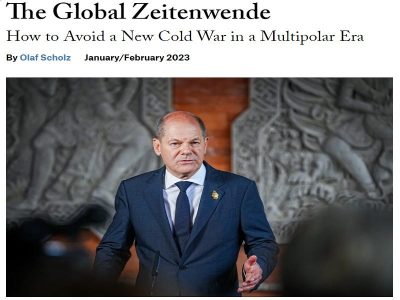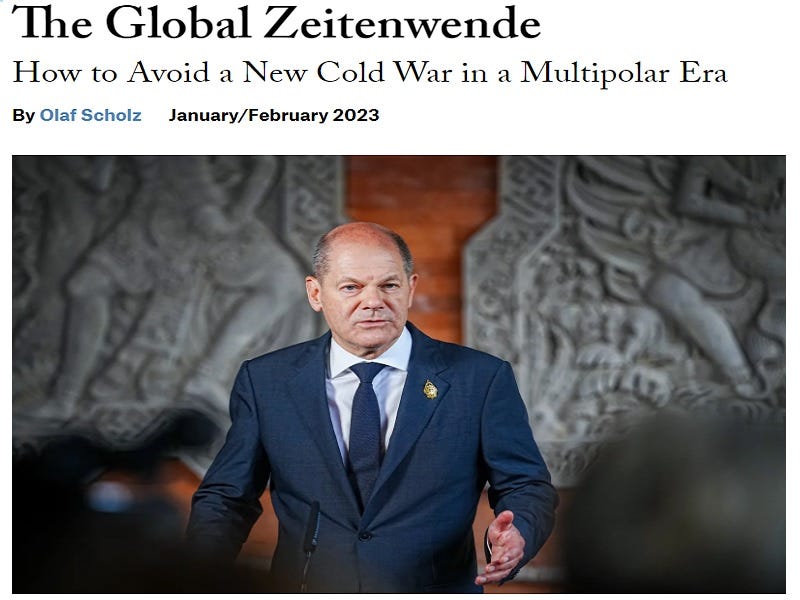Olaf Scholz’s “Manifesto” Confirms Germany’s Hegemonic Ambitions. “Zeitenwende”, Turning Point in History.

All Global Research articles can be read in 51 languages by activating the Translate Website button below the author’s name.
To receive Global Research’s Daily Newsletter (selected articles), click here.
Follow us on Instagram and Twitter and subscribe to our Telegram Channel. Feel free to repost and share widely Global Research articles.
***
The German leader just published what can be interpreted as his manifesto explaining why his country must supposedly restore its prior hegemonic status, and it was released by none other than the same magazine run by the Council on Foreign Affairs, which is regarded as among the most influential policymaking platforms in the US-led West’s Golden Billion. The very fact that they ran his manifesto can be regarded as this de facto New Cold War bloc’s tacit support for Germany’s hegemonic ambitions.
Poland Isn’t As Paranoid As Some Speculated
Polish grey cardinal Jaroslaw Kaczynski wasn’t off the mark in recently warning against German domination of Europe in comments that echoed those from a year ago wherein he accused that country of wanting to build a “Fourth Reich”. His country previously hyped up its neighbor’s military threat to Central Europe in order for Warsaw to consolidate its regional influence, but Chancellor Olaf Scholz’s manifesto for Foreign Affairs magazine proves that Berlin’s hegemonic ambitions do indeed exist.
Germany’s New Strategic Culture
Titled “The Global Zeitenwende: How to Avoid a New Cold War in a Multipolar Era”, the German leader articulated the range of means that the EU’s de facto leader is poised to employ for comprehensively entrenching its influence across the bloc on the basis of supposedly reacting to the Ukrainian Conflict. The first one-third of the piece is just an explanation of how everything got to this point from his government’s perspective, but then he transitions to talking about tangible policies.
In Scholz’s words, “Germany’s new role will require a new strategic culture, and the national security strategy that my government will adopt a few months from now will reflect this fact”, which frames everything that follows in his article. Russia is the primary target of this strategy as proven by the Chancellor declaring that “the guiding question will be which threats we and our allies must confront in Europe, most immediately from Russia.”
He then patted himself on the back for pushing through constitutional reforms earlier in the year for facilitating his government’s plans to expound approximately $100 billion in modernizing the Bundeswehr, which he accurately described as “mark[ing] the starkest change in German security policy since the establishment of the Bundeswehr in 1955.” Two percent of GDP will also be invested in defense in accordance with the US’ prior demands of its NATO partners.
“Military Diplomacy”
Complementary with Germany’s unprecedented post-World War II military buildup is Scholz’s policy of reversing its prior refusal to export arms to active conflict zones in order to equip Kiev. Not only that, but his country will also train an entire brigade of Ukrainian troops on its territory as part of a new EU mission alongside replacing Soviet-era arms that former Warsaw Bloc countries give Kiev with modern German ones.
Beyond its borders, Scholz said that “Germany has significantly increased its presence on NATO’s eastern flank, reinforcing the German-led NATO battle group in Lithuania and designating a brigade to ensure that country’s security. Germany is also contributing troops to NATO’s battle group in Slovakia, and the German air force is helping monitor and secure airspace in Estonia and Poland. Meanwhile, the German navy has participated in NATO’s deterrence and defense activities in the Baltic Sea.”
Of particular concern was the Chancellor reaffirming that “Germany will continue to uphold its commitment to NATO’s nuclear sharing arrangements, including by purchasing dual-capable F-35 fighter jets”, which is bound to rattle Russia. Quite clearly, Scholz intends for Germany to compete with Poland as the US’ top military proxy in the EU, to which end he’s hoping that Berlin’s more impressive military capabilities and existing nuclear sharing partnership with Washington will give it the edge over Warsaw.
Institutional Expansion
This observation shouldn’t be interpreted as an intent to revise the geopolitical outcome of World War II like some in Poland have speculated with respect to what they refer to as their country’s “Recovered Territories” that now form its border with Germany. Rather, it just means that Germany is becoming more confident flexing its military might in the sense of comprehensively enhancing its partners’ defensive capabilities per their leaderships’ request, though it’s true that this risks making them vassals.
More than likely, Scholz will seek to replicate this exact same strategy across the Western Balkans upon those aspirant states’ ultimate membership in the de facto German-led EU after they complete the so-called Berlin Process that he talked about having revived in his article. Despite acknowledging the difficulties of admitting new members, the Chancellor spoke about the promise that this outcome would have for bolstering the bloc’s potential to set new global standards for trade and the environment, et al.
This ambitious agenda will be advanced in full cooperation with France, according to Scholz, which he described as “shar[ing] the same vision of a strong and sovereign EU.” Migration and fiscal policies must be reformed, he said, in order to prevent external forces like Russia from supposedly exacerbating intra-bloc divisions. His proposed solution for streamlining progress on these sensitive issues is to “eliminat[e] the ability of individual countries to veto certain measures.”
Entrenching Influence
There’s no other way to describe the aforementioned reform than as amounting to an unprecedented political power play exactly of the sort that Hungary and Poland previously warned about. If successful, then it’ll result in the complete subjugation of all EU members to the Franco-German duopoly, thus eliminating those vestiges of sovereignty that they still retain. In other words, this Great Power axis will become the only one that matters in Europe.
It’ll likely be impossible for smaller states to ever restore their lost rights either in the event that Germany assumes direct control over their militaries sometime in the future like Scholz’s proposal for standardizing the EU’s weapons systems very strongly suggests will inevitably happen. That rising hegemon’s expanded military presence along the bloc’s eastern periphery that he spoke so highly about earlier in the article could inevitably lead to that in order to entrench Berlin’s political influence.
Similar so-called “coup plots” like the one that its authorities claim to have foiled on Wednesday could become the pretext upon which Germany assumes direct control over Central European countries’ militaries on the basis of supposedly helping them sustainably ensure “law and order”. Seeing as how those forces might by that time have standardized their weapons systems, they’d be perfectly interoperable with Germany’s, especially if they’ve already carried out multiple joint exercises by then.
The Real China Connection
The rest of Scholz’s article talked a bit about Germany’s forthcoming approach to China, but those plans aren’t as directly relevant to his country’s hegemonic ambitions as those that it’s poised to implement against Russia, hence why they’ll remain outside the scope of the present analysis. Upon reviewing the insight that’s been shared thus far, it’s clear that “Germany’s Century-Long Plot to Capture Control Of Europe Is Almost Complete”, with each passing day reducing the likelihood of offsetting this scenario.
Its leader just published what can be interpreted as his manifesto explaining why Germany must supposedly restore its prior hegemonic status, and it was released by none other than the same magazine run by the Council on Foreign Affairs, which is regarded as among the most influential policymaking platforms in the US-led West’s Golden Billion. The very fact that they ran his manifesto can be regarded as this de facto New Cold War bloc’s tacit support for Germany’s hegemonic ambitions.
The takeaway is that America aspires to restore its declining unipolar hegemony by facilitating Germany’s hegemonic revival in order to rely on that country as its premier “Lead From Behind” (LFB) proxy for managing the Golden Billion’s anti-Russian containment efforts in Europe. This policy is aimed at allowing the US to focus more on expanding NATO to the Asia-Pacific so as to advance its anti-Chinese containment efforts in the other half of Eurasia.
That incipient development is meant to make it more likely that the People’s Republic agrees to America’s terms for the series of mutual compromises between them for establishing a balance of influence that’ll eventually become the “new normal”. It’s important for these two superpowers to make tangible progress on the New Détente ahead of Secretary of State Blinken’s planned trip to Beijing sometime early next year, ergo the timing behind Foreign Affairs’ publication of Scholz’s manifesto.
Concluding Thoughts
The grand strategic context within which he articulated Germany’s hegemonic ambitions is therefore to facilitate its American patron’s gradual refocusing away from Western Eurasia towards its Eastern half as his country assumes the role of the US’ top LFB proxy in Europe for containing Russia. This sequence of events for enhancing the West’s containment of China is tacitly endorsed by the Golden Billion’s elite as evidenced by Foreign Affairs publishing his related article, thus confirming that the US’ plan is in motion.
*
Note to readers: Please click the share buttons above or below. Follow us on Instagram and Twitter and subscribe to our Telegram Channel. Feel free to repost and share widely Global Research articles.
This article was originally published on the author’s blog site, Andrew Korybko’s Newsletter.


